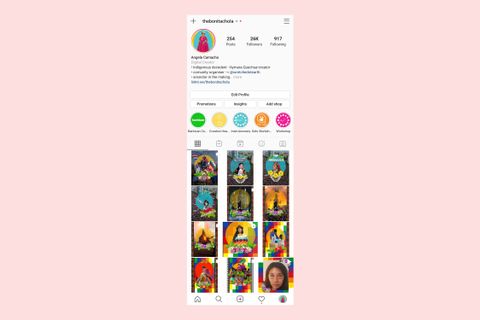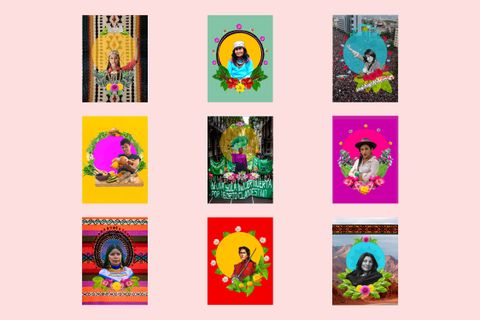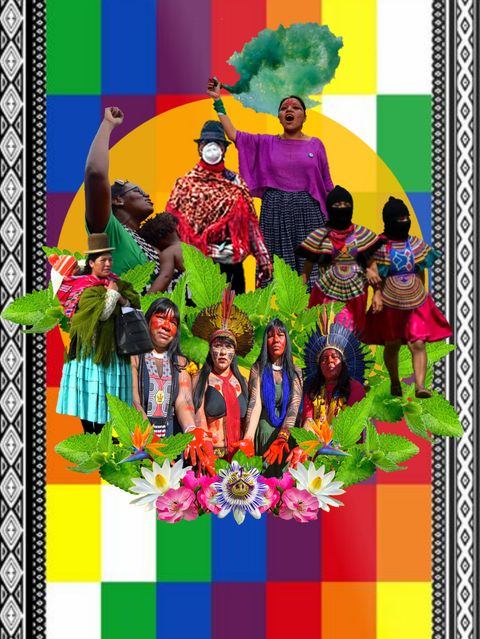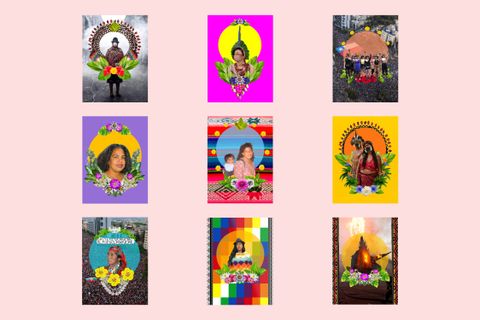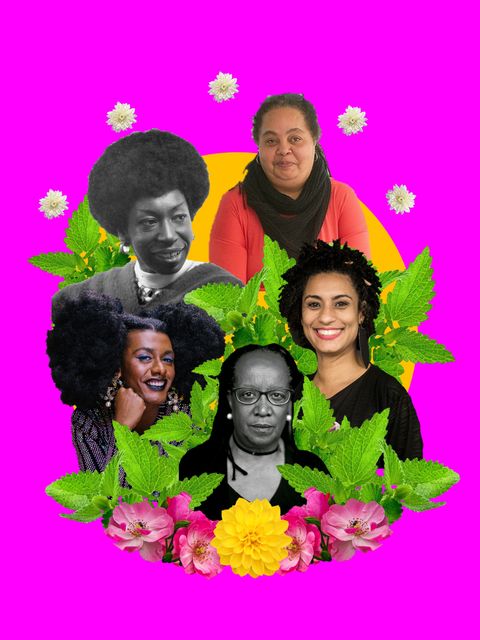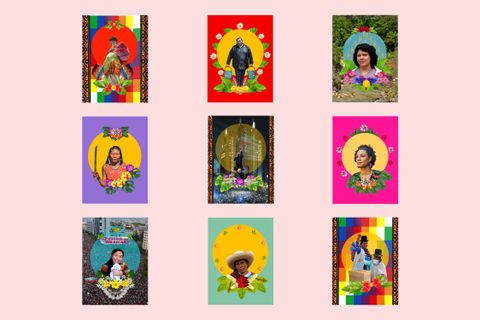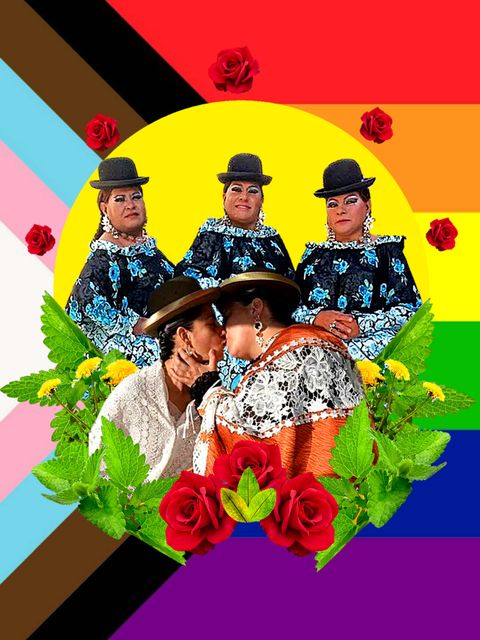DIÁSPORAS QUE LUCHAN
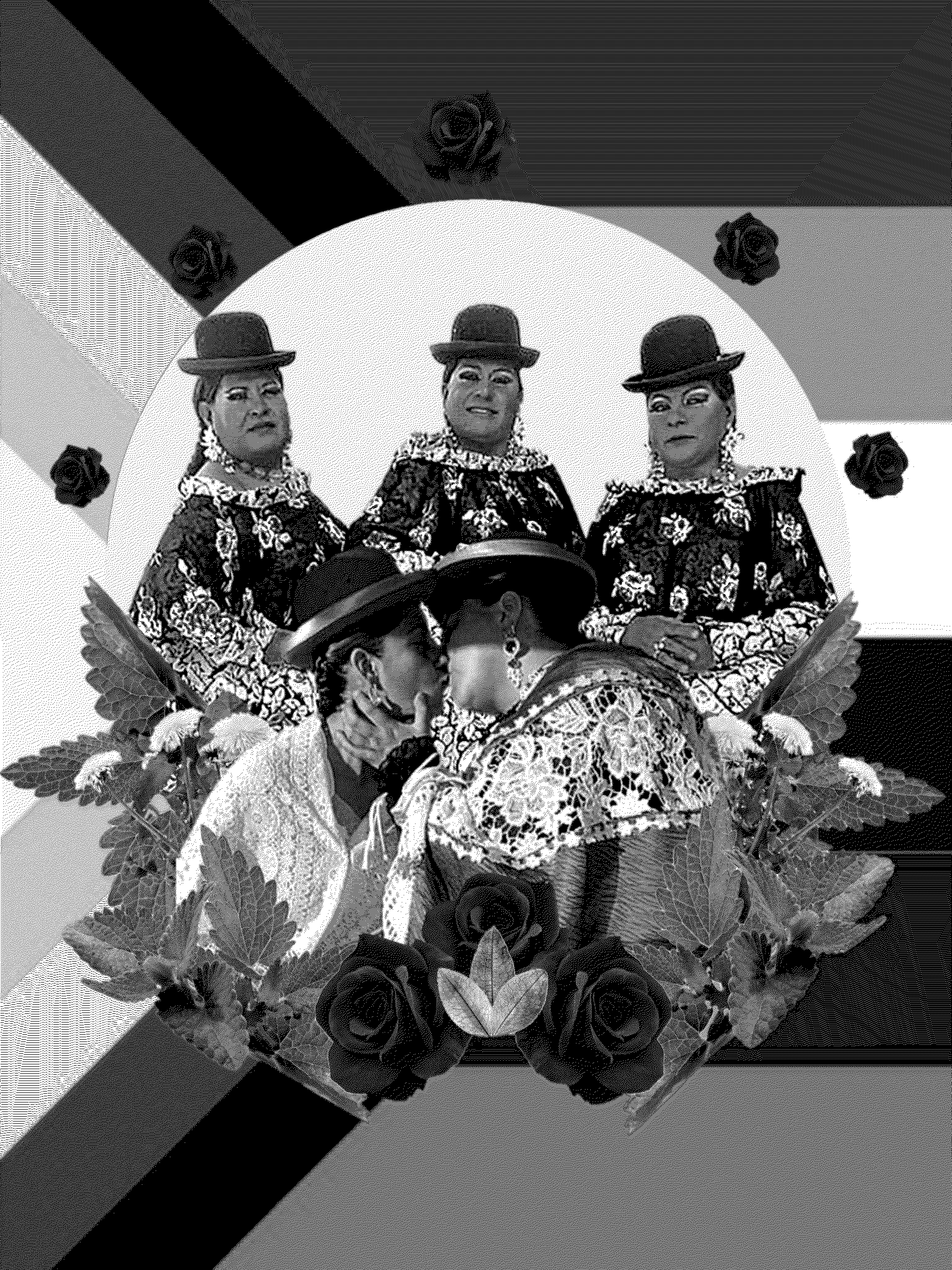
DIÁSPORAS QUE LUCHAN
(Diasporas that Fight)
The Bonita Chola (aka Angela Camacho)
TINKU WARMI (Idioma Aymara, “Encuentro Mujeres”)
Mis manos saludan al tata Inti en cualquier parte del mundo
saludan cansadas de no sentir pero siempre recuerdan
que son hijas wawas de la tierra
somos Indígenas Indígenas Decendientes Y en la piel
una no siente la aucensia de la madre tierra por que somos su continuidad
somos la extención de la pacha y la llebamos con nosotras
a todos lados a todas partes, La sentimos completa
Su abundancia Su dolor
Tu perdida.
Caminamos por que nuestra piel
nunca ha dejado de exitir
caminamos para crear un nuevo camino
caminamos aquí haya cerca lejos
cada uno de nuestros pasos marca soverania, grita dignidad en nuentro pensaminto
en nuentra realidad no existe la aucensia de la madre tierra.
Como sera eso nos preguntamos?
TINKU WARMI
My hands greet our tata inti (sun) in all corners of the world;
they wave, fatigued from unfeeling but remembering always
that they are daughters of the wawas (kids) of the Earth.
we are Indígenas, Indigenous descendants and in our bones
we do not feel removed from la madre tierra because we are continuum, we are the scope of our Pacha (mother earth) and we carry her with us
wherever we are wherever we go; We feel her wholly;
Her abundance Her pain
Her loss.
We march on because our very skin
has never stopped existing
We march on to carve a new path
We march on from here to there, near and far
each step marking empowerment, a cry for dignity.
In our thoughts in our reality, there is no loss of our Mother Earth.
How could that be? we ask ourselves.
The Bonita Chola uses images of strong activist female role models from the Abya Yala, Indigenous, and Black communities, who have been ignored and erased by history. She evokes collective memories and stories of struggle through digital collage making. With only her mobile phone, she creates tools with minimum resources to share with grassroots organising back home, to explore the reconstruction and deconstruction of identity, and focus on her inner feelings and thoughts.
DÍA DE LA RESISTENCIA INDÍGENA (Indigenous Resistance Day)
Text by The Bonita Chola and @ja_kgender, translation by The Bonita Chola. This text is an excerpt from their essay “From Colonial Barbarism to the Present of Capitalist Looting: Abya Yala (So-Called Americas) in Struggle”.
…On 12 October 1492, the colonisation began by means of which the gigantic original capitalist accumulation was perpetrated, which promoted the Industrial Revolution and European supremacy worldwide and which threw the Abya Yala peoples into centuries of colonial plunder and later into centuries of neocolonialism and capitalist plunder. From the genocide and looting perpetrated during the colonisation, the aristocracy and the European bourgeoisie accumulated an unprecedented fortune, which would propel Europe as a capitalist metropolis. The British and European population colony—that today is known as the United States—would also propel itself as a capitalist metropolis based on slavery and the expansionist policy of its bourgeoisie, who would assume the predatory continuity against the rest of the continent.
The world’s greatest fortunes were built through genocide, deportation, enslavement, and looting. The current geopolitical relations between capitalist metropolises and the peripheries of capitalism have a historical origin marked in blood. The members of the exploiting class in the American continent, from north to south, are the direct descendants of colonial barbarism and are the accomplices of the looting perpetrated by transnational capitalism (slave fortunes continue to prevail, along with new looters).
For 528 years since October 1492, we verify the continuity of the struggle of the Abya Yala (America) people, as well as the continuing predatory behaviour of imperialism. The peoples rise up, against capitalism and their barbarism, against the bourgeois states who agree to poisoned loans with imperialist institutions like the IMF, whose amounts will go to the infrastructure required by the multinationals, to increase plundering the resources and line the pockets of the bourgeoisie, and whose usury interests the peoples will have to pay with their blood…
DÍA INTERNACIONAL DE LA MUJER AFROLATINAMERICANA, AFROCARIBEÑA Y DE LA DIÁSPORA (International Afro-Latino, Afro-Caribbean and Diaspora Women’s Day)
Text by The Bonita Chola and Ana Lucía Mosquera, translation by The Bonita Chola.
-
Afro-Latino, Afro-Caribbean and Diaspora Women’s Day has been celebrated every 25 July since 1992.
-
Cultural Relevance. The central axis of this commemoration is the struggle for inclusion, for justice and equality for Afro-descendant women in Latin America and the Caribbean. Likewise, that first meeting on 25 July 1992 in the Dominican Republic is commemorated, the starting point for the struggle towards the vindication and visibility of the Afro woman and all her cultural and social contributions in the conformation of the States, a struggle marked by advocacy for the change and structural transformation of racial discrimination, violence, sexism, exclusion, poverty, and migration.
-
History. This commemoration was instituted in 1992, within the framework of the First Meeting of Afro-Latin and Afro-Caribbean Women held in the Dominican Republic. Around 400 women from different countries in Latin America and the Caribbean met, in order to analyse the consequences of racism and sexism in the region, articulate actions to combat it and honour Afro-descendant women leaders of this struggle.
-
With this meeting, the Network of Afro-Latin American, Afro-Caribbean and Diaspora Women emerged. It recognises itself as a space for reflection and commitment to work for the rights of Black women, in their capacity as full and committed citizens with the construction of more just and equitable nations.
-
The commemoration of this date should invite us to have an intersectional look at the situation of Afro-descendant women, to claim their existence and their struggles, to respect their culture and their manifestations; and to address their contexts in a differentiated way, traversed by violence as a product of racism, colonization, sexism, classism, capitalism, homo-lesbo-transphobia, and other oppressions.
In the collage on the previous page are: Ochy Curiel, Victoria Santa Cruz, Marialle Franco, Sueli Carneiro, and Liniker.
Pride
Text by The Bonita Chola and @ ja_kgender, translation by The Bonita Chola.
Today we reaffirm and remember that cisheterosexualidad is a colonial system. Sexual diversity has historically been the norm, not the exception, among Indigenous peoples. The ancestral languages prove it. In Juchitán, Mexico, the muxes are neither male nor female, but rather a hybrid of both as the Zapotec gender. For our brothers of North America, the identity “two spirits” refers to a person who identifies male and female, and is used by some Indigenous people to describe their sexual, gender and/or spiritual identity.
In the Andes region of what is now called Bolivia, we have the word “Chacha-Warmi”, which means man-woman. In Hawai’i, the māhū encompass both the feminine and the masculine. The Maori term takatāpui describes intimate same-sex friendships. Non-monogamy is the norm among the Zo’é peoples in the Amazon and the Ladakhis in the Himalayas. In other words, Indigenous sexualities/sexual identities were never heterosexual: from cross-dressing to homo-affective families, they are as diverse as the peoples who practise them. The disagreements that belong to Indigenous communities are doubly segregated. Despite the fact that both machismo and heteronorma were systems of violence imposed by colonialism, they continue to prevail in most Indigenous communities. The resistance of the communities is a double struggle: they have to choose between living their diverse identity or their Indigenous identity.
Mucho amor y fuego en su lucha! Que es la nuestra tambien, quemar la heteronorma y el patriarcado: RESABIOS DE LA COLONIZACIÓN!
About the author
-
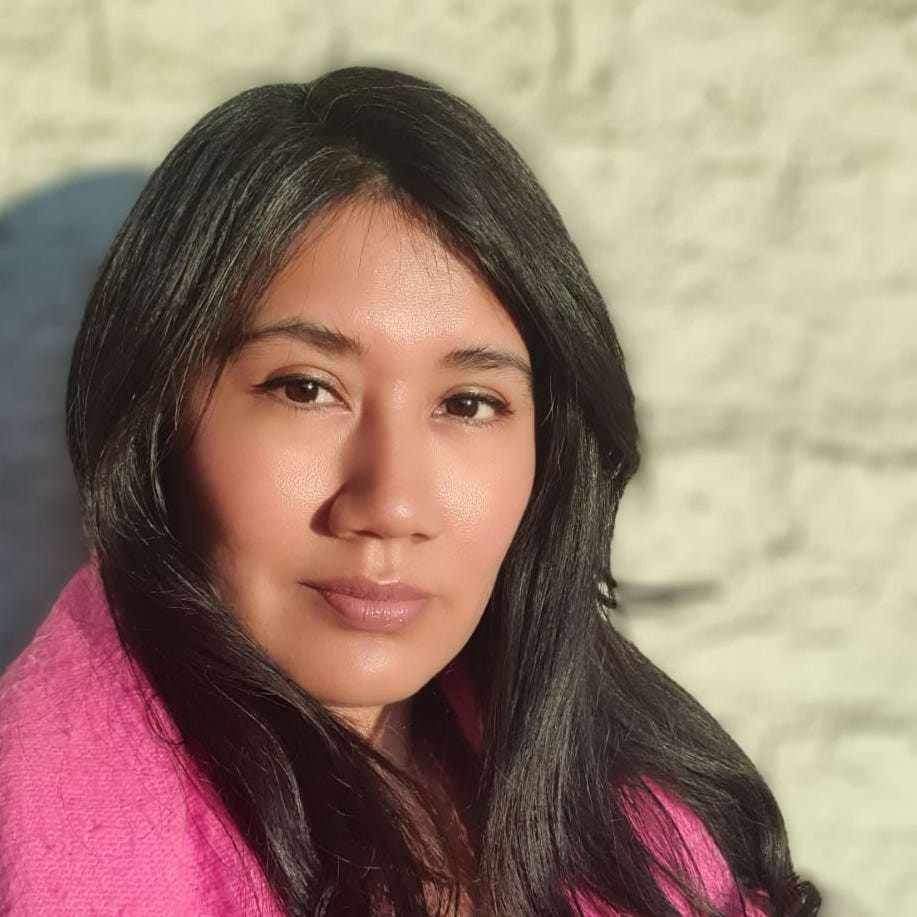
The Bonita Chola (aka Angela Camacho) is an Indigenous descendant, domestic worker, creative, Bruja, community organiser, and ancestor in the making, whose work is rooted in the need to take back a sense of space and a place of origin, moving away from colonialism. Her practices nurture the connection with the Bruja (read: witch) person that is inherent in all women, evolving collective memories and stories, exploring reconstruction and deconstruction of identity, and focusing on feelings and thoughts (sentipensar).
Angela collaborates with women and children in under-represented areas of London to produce and deliver healing arts and crafts workshops that are grounded in her Indigenous culture and traditions; with the hope to pass knowledge, to heal from colonialism, to recover the herstory of women of colour, and to reconnect with the past to project on the future. Her work brings together communities, artists, and activists to explore issues of sexism, environmental crisis, multinational exploitation, housing and welfare for refugees and migrants.
Imprint
| Author | The Bonita Chola (aka Angela Camacho) |
|---|---|
| Date | 30 November 2020 |
| Category | Artist Collaboration |
| Review status | Peer Reviewed (Editorial Group) |
| License | Creative Commons Attribution-NonCommercial 4.0 International (CC BY-NC 4.0) |
| Downloads | PDF format |
| Article DOI | https://doi.org/10.17658/issn.2058-5462/issue-18/acamacho |
| Cite as | Chola (aka Angela Camacho), The Bonita. “DIÁSPORAS QUE LUCHAN: (Diasporas That Fight).” In British Art Studies. London and New Haven: Paul Mellon Centre for Studies in British Art and Yale University Press, 2020. https://doi.org/10.17658/issn.2058-5462/issue-18/acamacho. |
